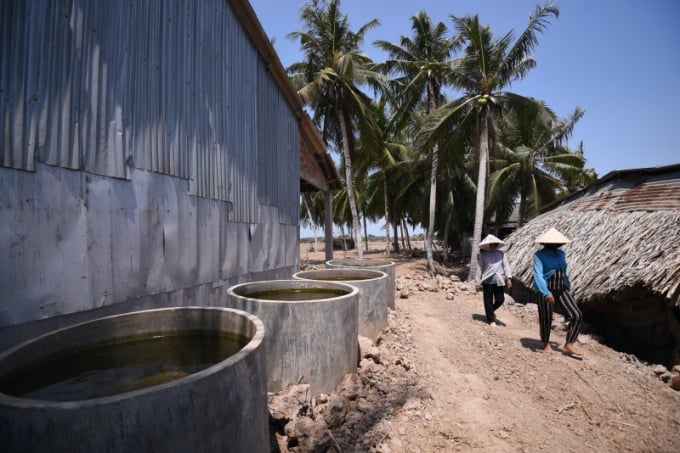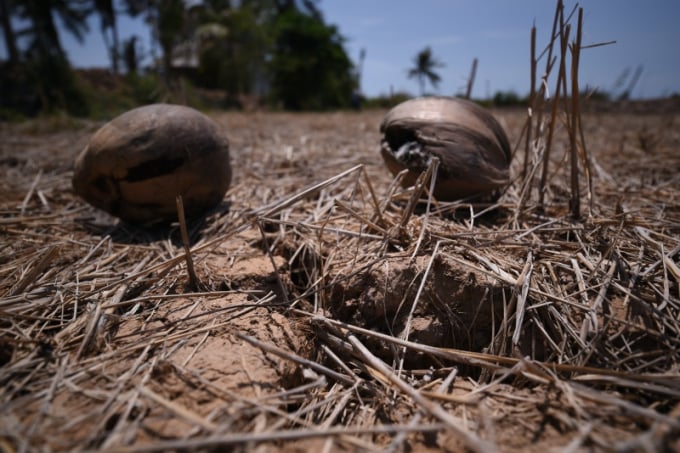June 19, 2025 | 03:11 GMT +7
June 19, 2025 | 03:11 GMT +7
Hotline: 0913.378.918
June 19, 2025 | 03:11 GMT +7
Hotline: 0913.378.918

Climate change has caused a serious water shortage in Ba Tri freshwater lake, Ben Tre Province. Photo: Tung Dinh.
Climate change has caused severe loss worth more than VND2,500 billion to Vietnam’s agricultural production and food security in the first half of the year.
Mr. Nguyen Song Ha, Assistant Representative of the Food and Agriculture Organization (FAO) Program in Vietnam, said in an interview with Nong Nghiep (Agriculture) newspaper that natural disasters of many types occurred in the first six month of the year had completely damaged 100,000 hectares of rice and crops with financial loss due to drought and saline intrusion worth more than VND2,500 billion.
The FAO official was quoted with such statistics from a report issued by the General Department of Natural Disaster Prevention and Control under the Ministry of Agriculture and Rural Development (MARD).
He said similar data also showed that climate change is threatening food security sustainability in the world as well as in Vietnam.
Food security, according to Ha, needs to be understood in four areas: the availability, accessibility, use, and sustainability of the food system.
Natural disasters and extreme climates caused by climate change are negatively affecting all such 4 areas.
For Vietnam, Ha said, although the country has made great progress in agricultural production and is becoming a big supplier of numerous agricultural products in the world market, it needs to anticipate negative factors that cause impacts on the supplying sources making them become harder to access and more difficult to stabilize.
The unstable supplying sources may be affected by natural and social issues especially a wave of immigration from rural to urban areas and industrial zones in search of higher income.
“This will push rural labor to a scarcity situation,” said Ha.

Dry fields in Ba Tri freshwater lake, Ben Tre Province. Photo: Tung Dinh.
Climate change will directly cause effects on food security in three ways: (1) reducing food production as well as the efficiency of the entire value chain, affecting livelihoods (employment and wages) and causing agricultural economic losses. (2) influencing the food utility due to negative effects on health, sanitation, clean water, and similar areas; (3) reducing food supply stability due to the loss of rural property and infrastructure as well as epidemic diseases.
Speaking about FAO programs that are being implemented in Vietnam, the representative said those on food security are always the focus of FAO since its first years of operation in the country.
FAO has introduced varieties of plants, animals, and techniques to meet the local food demands of people.
The UN organization has pioneered the IPM (integrated pest management) program creating sustainable growth in crops since the mid-1990s, and it has become a prerequisite for Vietnam's IPM scheme to be issued in the year 2015.
Since 2012, when the Secretary-General of the United Nations launched the Hunger-Free Initiative (largely coinciding with Sustainable Development Goal 2), Vietnam has immediately shown a positive response.
In the agricultural sector, with threats from major pandemics - especially zoonotic diseases - FAO has been working with the health and agriculture sectors to address epidemic threats since 2004 including the establishment of an epidemiological surveillance network, building a management framework to minimize drug resistance in livestock and aquaculture.
Currently, together with the One-Health Program, the IPM Program is also being reviewed in the spirit of the UN declaration 2020-the International Year of Plant Health-to help bring out radical solutions making a contribution to developing long-term national food security.
FAO and the United Nations agencies have co-operated with Vietnam to develop a National Action Plan on "Zero Hunger" in the country by 2025. A Steering Committee has been set up with a Deputy Prime Minister as the Head and MARD as the standing agency.
The UN body also accompanies Vietnam in the decade of the United Nations on Nutrition Action (2016 - 2025), whereby many programs and projects on integrating nutrition and agriculture have been effectively implemented.
According to the latest statistics, over 820 million people around the world are currently hungry for food but climate change could increase by another 122 million people - mainly farmers, put them to extreme poverty by 2030, and push the price of grain up 29% between now and 2050.
On one hand, agriculture now helps ensure livelihood for about 2.5 billion people worldwide. It is also providing sources of food for all mankind. However, the industry is currently suffering from 26% of the economic impact due to natural disasters in general, and in particular, the tolerance in droughts in developing countries is up to a high level of 83%.
On the other hand, agriculture itself is also a huge emitter of greenhouse gases. In general, agriculture, forestry and other land uses are generating about a quarter of the emissions (livestock industry alone accounts for 14.5%).
About one-third of the total global land area is being degraded, creating 78 gigatons of CO2 into the atmosphere, causing the loss of value in biodiversity and fertility services equivalent to 10% of GDP.
In Asia, between 2005 and 2015, damage due to natural disasters was estimated at USD48 billion, of which 77% was due to flooding.
In the long term, experts have warned, if the world is not soon mitigating and adapting to climate change, humanity will face great challenges as the population is increasing while the agricultural land fund continues to decline.
Author: Van Viet. Translated by Linh Nguyen. Edited by Duc Huy.

(VAN) To address plastic pollution, closing the plastic recycling cycle will bring significant economic and environmental benefits.

(VAN) According to the Binh Thuan Department of Industry and Trade, in the first five months of 2025, Binh Thuan's dragon fruit export turnover increased by 20.65% compared to the same period last year.

(VAN) EU countries on Thursday gave final approval to new tariffs on fertilizer imports from Russia, a move aimed at cutting off revenue that could support Moscow’s war in Ukraine, despite concerns from European farmers.

(VAN) The working delegation from the Ministry of Agriculture and Environment conducted an important trip to the Netherlands to strengthen strategic partnerships and sustainable development in the agricultural sector.

(VAN) The letter ‘A Plea from the Ocean’ not only evokes emotion but also awakens the human conscience to the responsibility of protecting life on Earth.

(VAN) The Department of Agriculture in South Africa has announced the country’s first mass vaccination of poultry to prevent local birds from contracting avian influenza.

(VAN) Establishment of the Mekong Delta Regional Agricultural Linkage Center, aiming for a closed value chain, deep processing, trading platforms, and international market connectivity.